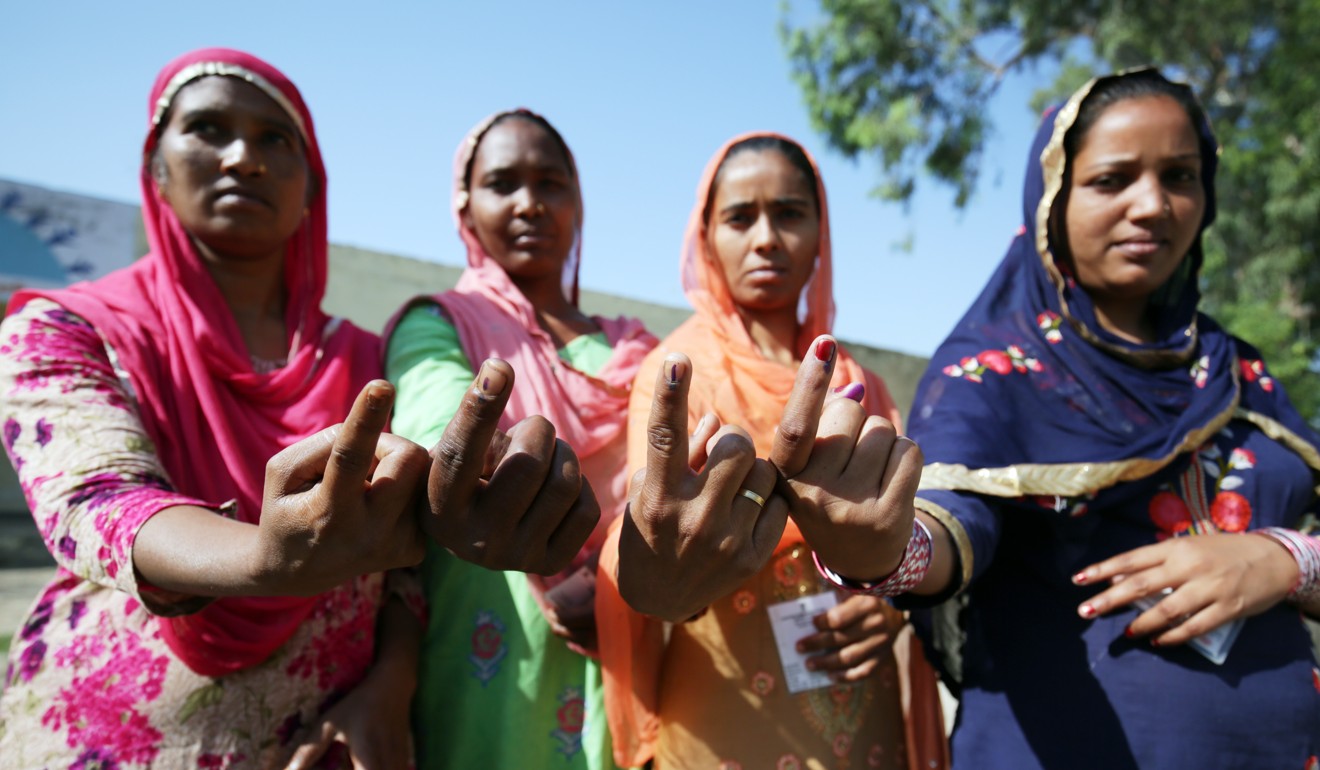
India election: Narendra Modi’s BJP coalition looks set to retain power with stronger support than before
- An exit poll showed the prime minister’s Bharatiya Janata Party-led coalition was projected to dominate the 545-member lower house of parliament
India’s ruling coalition led by the Bharatiya Janata Party (BJP) on Monday looked set to win an even bigger majority in parliament than the massive mandate it got five years ago, exit polls showed after the election ended on Sunday.
An exit poll from India Today Axis on Sunday showed Prime Minister Narendra Modi’s BJP-led National Democratic Alliance was projected to win between 339 and 365 seats in the 545-member lower house of parliament, with the opposition alliance led by the Indian National Congress projected to get only 77 to 108.
A party needs 272 seats to command a majority.
Modi and other top BJP leaders made no immediate claim of victory. However party spokesman GVL Narasimha Rao said the polls “clearly show a huge positive vote for the leadership of Narendra Modi”.
A Congress spokesman dismissed the accuracy of the numbers, as the opposition refused to concede. “If the exit poll figures are true then my dog is a nuclear scientist,” Sanjay Jha said on Twitter.
India elections: BJP may need the allies Narendra Modi drove away
Modi faced criticism in the run-up to the election over unemployment – in particular, for failing to provide opportunities to young jobseekers – and for weak farm prices.
But he rallied his Hindu nationalist base and made national security the theme of the campaign after a bomb attack in Indian-controlled Kashmir by Pakistan-based militants brought about a surge in tensions between the neighbours in February.

A strong showing for the BJP will motivate Modi to carry on with the strategy, suggested political observer Happymon Jacob, a professor at Jawaharlal Nehru University.
Modi’s administration began its first term with much “foreign policy symbolism”, but eventually changed focus after realising the only foreign policy message that resonated domestically was the tough stance on Pakistan, Jacob said.
Kashmir group calls for UN to investigate torture by Indian troops
“If Modi comes back to power, they will feel that the path they have taken vis-à-vis foreign policy was accurate. Some aspects may change – there may be a reaching out to Pakistan – but I don’t see a fundamental change.
“If a different government comes to power, I see a substantial change: decentralisation, bringing the Ministry of External Affairs into focus and investing more on traditional diplomacy,” he said.
Some issues that Hindu groups are likely to raise if a BJP-led coalition takes office include a Hindu temple on a disputed site, life in jail for killing cows, and ending the autonomy of India’s only Muslim-majority state.
BJP parent Rashtriya Swayamsevak Sangh (RSS) said it would hold a three-day dharm sansad, or religious parliament, in the northern city of Jammu starting on June 21 to press the new government on many of their main demands that had been put on the back burner around the election.
“We did not want the opposition to make it an issue against the BJP, so had stopped our agitation,” Mahendra Rawat, the Delhi head for RSS, said. “The Ram temple is the biggest issue for us Hindus.”
Exploiting Islamophobia: an election-winning tool in India
Many Hindus believe a mosque razed in 1992 was built in the same place where Lord Ram, a physical incarnation of the Hindu god Vishnu, was born. They also point to evidence there was a temple there before the mosque was built in 1528. The destruction of the mosque by a Hindu mob had led to riots that killed about 2,000 people across the country.
Other RSS affiliates, the Vishva Hindu Parishad and the Bajrang Dal, said they also want the cow – considered sacred by many Hindus – to be declared a national animal whose killing would be an offence punishable with life in jail.

India’s seven-phase general election began on April 11 and ended on Sunday with about 65 per cent of the 900 million eligible voters taking part.
Indian shares soared 3.75 per cent on Monday, the biggest jump in nearly six years, as markets greeted the news of Modi’s likely second term.
Traders called the polls boost to Modi’s right-wing government a sign of stability for one of the world’s fastest-growing major economies.
Opinion: India’s commitment to diversity and tolerance hangs in the balance
“This ends a significant political uncertainty,” said Sujan Hajra, an economist at Anand Rathi securities in Mumbai, who described Modi as a “market reformer”.
“The Modi government with its second term will continue with its policies and it is easier for businesses and traders to carry on with their expansion or investment plans which already have been initiated,” he said.

Others echoed his view.
“These exit polls have given a high level of comfort for investors and the governmental policies initiated in the first term will only gain momentum,” said Amar Singh of Angel Broking.
Trade negotiations, especially the Regional Comprehensive Economic Partnership (RCEP), would be an area of attention for the new government, said Afsar Jafri, a senior research associate at Focus on the Global South.
“For India, the focus will be on what concessions are possible for the agriculture, small-scale industries and dairy sectors,” he said.
The Delhi-based Centre for Media Studies estimated that parties spent more than US$7 billion on the election, making it one of the most expensive campaigns in the world.
Much of the cash was spent on social media, where the parties used armies of “cyber warriors” to bombard India’s Facebook and WhatsApp users with messages.
Votes will be counted on Thursday. The BJP will meet its coalition partners on Tuesday to discuss a new government.
Reporting by Reuters and Agence France-Presse


